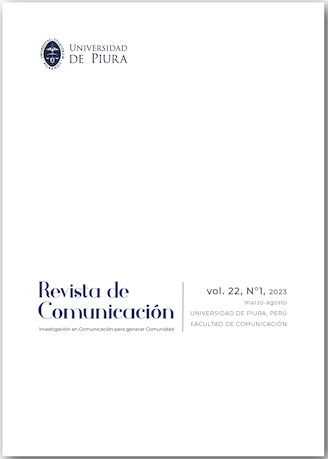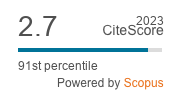The use of Twitter as a strategic dialogue platform for IBEX35 companies during the pandemic
DOI:
https://doi.org/10.26441/RC22.1-2023-2989Keywords:
Covid-19, dialogue, corporate reputation, Twitter, stakeholders, communication, IBEX35, social networks, engamement, pandemicAbstract
This paper analyses the communication carried out by IBEX35 companies in crisis situations in order to determine the mechanisms that try to favour dialogue between organisations and their stakeholders. The sample is made up of the tweets that include the word covid and that have been issued by the 27 IBEX 35 companies that had verified corporate profiles on the Twitter social platform during the first 6 months of the COVID-19 pandemic in Spain. Taking into consideration the dialogic principles established by Kent and Taylor (1998), which were adapted by Rybalko and Seltzer (2010) for Twitter, an adaptation was made to establish indicators to apply to the conversation established on the platform. To analyse the differences in interaction, the t-test for independent samples and the one-factor ANOVA were used. The results show that companies maintain an interest in engaging with their audiences but continue to deal with topics that are not of interest to users, which makes it difficult for a dialogue or conversation to take place between companies and stakeholders. The article shows that the resources most used by companies in crisis situations are the call to action and dialogue, either by asking their users questions or suggesting the desired interaction. While directly asking users for their opinions does not generate more dialogue, the results show that soliciting attitudes, such as commenting, sharing an image or liking an image, does increase interaction. This implies that there is low interest on the part of audiences to join a real conversation.
Metrics
References
Abd-Alrazaq, A., Alhuwail, D., Househ, M., Hai, M., & Shah, Z. (2020). Top concerns of tweeters during the COVID-19 pandemic: A surveillance study. Journal of Medical Internet Research, 22(4), e19016. https://doi.org/10.2196/19016
Aced-Toledano, C., & Lalueza, F. (2018a). Cómo mejorar la relación con los públicos en social media. Análisis de buenas prácticas de las empresas del IBEX 35 y del FORTUNE 500 en Facebook, Twitter y blogs. Redmarka. Revista de Marketing Aplicado, 1(022), 5-26. https://doi.org/10.17979/redma.2018.01.022.4931
Aced-Toledano, C., & Lalueza, F. (2018b). Monologues in the conversational era: Assessing the level of dialogic communication that big firms are reaching on social media. Profesional de la Información, 27(6), 1270. https://doi.org/10.3145/epi.2018.nov.10
Abitbol, A., Meeks, J., & Cummins, R. G. (2019). Does Oil and Goodwill Mix?: Examining the Oil and Gas Industry’s Impact on Stakeholder Engagement on Facebook. Environmental Communication, 13(2), 192–208. https://doi.org/10.1080/17524032.2018.1546751
Arbeláez, M., & Onrubia, J. (2014). Análisis bibliométrico y de contenido. Dos metodologías complementarias para el análisis de la revista colombiana Educación y Cultura. Revista de Investigaciones UCM, 14(23), 14 - 31. http://dx.doi.org/10.22383/ri.v14i1.5
Akıncı, Z. B., Coşkun, G., & Ünüvar, S. (2022). Social media as a dialogical communication tool: Izmir metropolitan municipality example. Online Journal of Communication and Media Technologies, 12(2), e202210. https://doi.org/10.30935/ojcmt/11557
Anagnostopoulos, C., Parganas, P., Chadwick, S., & Fenton, A. (2018). Branding in pictures: Using Instagram as a brand management tool in professional team sport organisations. European Sport Management Quarterly, 18(4), 413-438. https://doi.org/10.1080/16184742.2017.1410202
Araujo, T., & Kollat, J. (2018). Communicating effectively about CSR on Twitter: The power of engaging strategies and storytelling elements. Internet Research, 28(2), 419–431. https://doi.org/10.1108/IntR-04-2017-0172
Badham, M., & Mykkänen, M. (2022). A relational approach to how media engage with their audiences in social media. Media and Communication, 10(1), 54-65. https://doi.org/10.17645/mac.v10i1.4409
Barbeito-Caamaño, A., & Chalmeta, R. (2020). Using big data to evaluate corporate social responsibility and sustainable development practices. Corporate Social Responsibility and Environmental Management. https://doi.org/10.1002/csr.2006
Bolsa de Madrid. (2021). Empresas por sectores. http://www.bolsamadrid.es/esp/aspx/Empresas/EmpresasPorSectores.aspx
Bridgman, A., & Merkley, E. (2020). Replication Data for: The causes and consequences of COVID-19 misperceptions. Harvard Dataverse. https://doi.org/10.7910/DVN/5QS2XP
Capriotti, P., & Losada-Díaz, J.-C. (2018). Facebook as a dialogic communication tool at the most visited museums of the world. Profesional de la Información, 27(3), 642. https://doi.org/10.3145/epi.2018.may.17
Capriotti, P., & Zeler, I. (2020). Disseminating Latin American companies’ corporate social responsibility on Facebook: A comparative study with global companies. Palabra Clave, 23(2). https://doi.org/10.5294/pacla.2020.23.2.7
Chae, B., & Park, E. (2018). Corporate Social Responsibility (CSR): A Survey of Topics and Trends Using Twitter Data and Topic Modeling. Sustainability, 10(7), 2231. https://doi.org/https://doi.org/10.3390/su10072231
Chatfield, A. T., & Reddick, C. G. (2018). All hands on deck to tweet #sandy: Networked governance of citizen coproduction in turbulent times. Government Information Quarterly, 35(2), 259-272. https://doi.org/10.1016/j.giq.2017.09.004
Chen, Q., Min, C., Zhang, W., Wang, G., Ma, X., & Evans, R. (2020). Unpacking the black box: How to promote citizen engagement through government social media during the COVID-19 crisis. Computers in Human Behavior, 110, 106380. https://doi.org/10.1016/j.chb.2020.106380
Colleoni, E. (2013). CSR communication strategies for organizational legitimacy in social media. Corporate Communications: An International Journal, 18(2), 228–248. https://doi.org/https://doi.org/10.1108/13563281311319508
Edelman. (2020). Edelman trust barometer special report on COVID-19. https://www.edelman.com/research/covid-19-brand-trust-report
Emeksiz, G., & Şimşek, A. (2018). Communication strategies used in corporate Facebook pages and motivations of consumers for following these pages. European Journal of Marketing and Economics, 1(1), 122. https://doi.org/10.26417/ejme.v1i1.p122-134
Gómez, M., López, C., & Molina, A. (2019). An integrated model of social media brand engagement. Computers in Human Behavior, 96, 196-206. https://doi.org/10.1016/j.chb.2019.01.026
Guo, W., & Cannella, A. (2021). No need to know it all: Implications of COVID‐19 for corporate communication research. Journal of Management Studies, 58(5), 1421-1425. https://doi.org/10.1111/joms.12705
Hether, H. J. (2014). Dialogic communication in the health care context: A case study of Kaiser Permanente’s social media practices. Public Relations Review, 40(5), 856-858. https://doi.org/10.1016/j.pubrev.2014.07.007
Huang, Q., Lynn, B. J., Dong, C., Ni, S., & Men, L. R. (2022). Relationship cultivation via social media during the COVID-19 pandemic: Evidence from China and the u. S. International Journal of Business Communication, 232948842110678. https://doi.org/10.1177/23294884211067805
Huang, L., Clarke, A., Heldsinger, N., & Tian, W. (2019). The communication role of social media in social marketing: a study of the community sustainability knowledge dissemination on LinkedIn and Twitter. Journal of Marketing Analytics, 7(2), 64–75. https://doi.org/10.1057/s41270-019-00053-8
Jiang, Y., & Park, H. (2022). Mapping networks in corporate social responsibility communication on social media: A new approach to exploring the influence of communication tactics on public responses. Public Relations Review, 48(1), 102143. https://doi.org/10.1016/j.pubrev.2021.102143
Kent, M. L., & Taylor, M. (1998). Building dialogic relationships through the world wide web. Public Relations Review, 24(3), 321-334. https://doi.org/10.1016/S0363-8111(99)80143-X
Kent, M. L., & Taylor, M. (2002). Toward a dialogic theory of public relations. Public Relations Review, 28(1), 21-37. https://doi.org/10.1016/S0363-8111(02)00108-X
Kent, M. L., & Theunissen, P. (2016). Discussion, dialogue, discourse| elegy for mediated dialogue: Shiva the destroyer and reclaiming our first principles. International Journal of Communication, 10(0), 15. https://ijoc.org/index.php/ijoc/article/view/4571
Kent, M. L.,Taylor, M., Mcallister-Spooner, S. M. (2008). Research in dialogic theory and public relations. En Mathur, R. (ed.), Public relations: An ethics engagement. New Delhi: Icfai University Press, 1-17.
Kim, J. (2017). Effects of corporate online communication on attitude and trust: Experimental análisis of Twitter messages. Public Relations Journal, 11(2), 1-19.
Lee, Y. (2022). How dialogic internal communication fosters employees’ safety behavior during the COVID-19 pandemic. Public Relations Review, 48(1), 102156. https://doi.org/10.1016/j.pubrev.2022.102156
Lee, Y., & Kim, J.-N. (2021). On evolving nature of relationship by perspective mutuality: Reconceptualizing relationship typology between organization and its publics. Journalism & Mass Communication Quarterly, 98(1), 148-178. https://doi.org/10.1177/1077699020949255
Liu, W., Xu, W., & Tsai, J.-Y. (2020). Developing a multi-level organization-public dialogic communication framework to assess social media-mediated disaster communication and engagement outcomes. Public Relations Review, 46(4), 101949. https://doi.org/10.1016/j.pubrev.2020.101949
Lovejoy, K., Waters, R. D., & Saxton, G. D. (2012). Engaging stakeholders through Twitter: How nonprofit organizations are getting more out of 140 characters or less. Public Relations Review, 38(2), 313-318. https://doi.org/10.1016/j.pubrev.2012.01.005
Men, L. R., Tsai, W.-H. S., Chen, Z. F., & Ji, Y. G. (2018). Social presence and digital dialogic communication: Engagement lessons from top social CEOs. Journal of Public Relations Research, 30(3), 83-99. https://doi.org/10.1080/1062726X.2018.1498341
Monfort, A., Villagra, N., & López-Vázquez, B. (2019). Exploring stakeholders’ dialogue and corporate social responsibility (CSR) on twitter. Profesional de la Información, 28(5). https://doi.org/10.3145/epi.2019.sep.13
Moreno, Á., Fuentes-Lara, C., & Navarro, C. (2020). Covid-19 communication management in Spain: Exploring the effect of information-seeking behavior and message reception in public’s evaluation. Profesional de la información, 29(4).
Okazaki, S., Plangger, K., West, D., & Menéndez, H. D. (2020). Exploring digital corporate social responsibility communications on Twitter. Journal of Business Research, 117, 675–682. https://doi.org/10.1016/j.jbusres.2019.09.006
Pearce, W. B., & Pearce, K. A. (2004). Taking a communication perspective on dialogue. En Dialogue: Theorizing Difference in Communication Studies (pp. 39-56). SAGE Publications, Inc. https://doi.org/10.4135/9781483328683
Potts, L. (2014). Social media in disaster response: How experience architects can build for participation. Routledge, Taylor & Francis Group.
Ruggeri, A., & Samoggia, A. (2018). Twitter communication of agri-food chain actors on palm oil environmental, socio-economic, and health sustainability. Journal of Consumer Behaviour, 17(1), 75–93. https://doi.org/10.1002/cb.1699
Rybalko, S., y Seltzer, T. (2010), “Dialogic communication in 140 characters or less: How Fortune 500 companies engage stakeholders using Twitter”. Public Relations Review, Vol.36, No. 4, pág.336-341.
Saxton, G. D., Gomez, L., Ngoh, Z., Lin, Y. P., & Dietrich, S. (2019). Do CSR Messages Resonate? Examining Public Reactions to Firms’ CSR Efforts on Social Media. Journal of Business Ethics, 155(2), 359–377. https://doi.org/10.1007/s10551-017-3464-z
Simon, F., & Tossan, V. (2018). Does brand-consumer social sharing matter? A relational framework of customer engagement to brand-hosted social media. Journal of Business Research, 85, 175-184. https://doi.org/10.1016/j.jbusres.2017.12.050
Song, B., & Wen, J. (2020). Online corporate social responsibility communication strategies and stakeholder engagements: A comparison of controversial versus noncontroversial industries. Corporate Social Responsibility and Environmental Management, 27(2), 881–896. https://doi.org/10.1002/csr.1852
Taylor, M., Kent, M.L. & White, W.J., (2001), “How to activist organizations are using the internet to build relationships”. Public Relations Review, Vol. 27, pág. 263-284.
Thelen, P. D., Robinson, K. L., Yue, C. A., & Men, R. L. (2021). Dialogic communication and thought leadership: Twitter use by public relations agencies in the United States. Journal of Promotion Management, 27(1), 27-49. https://doi.org/10.1080/10496491.2020.1809595
Thelwall, M., & Levitt, J. M. (2020). Retweeting COVID-19 disability issues: Risks, support and outrage. Profesional de la Información, 29(2), 1-6. https://doi.org/10.3145/epi.2020.mar.16
Wang, Y., & Pala, B. (2020). Communicating philanthropic CSR versus ethical and legal CSR to employees: empirical evidence in Turkey. Corporate Communications. https://doi.org/10.1108/CCIJ-01-2020-0014
Wang, Y., & Yang, Y. (2020). Dialogic communication on social media: How organizations use Twitter to build dialogic relationships with their publics. Computers in Human Behavior, 104, 106183. https://doi.org/10.1016/j.chb.2019.106183
Wang, Y., & Zhou, S. (2015). How do sports organizations use social media to build relationships? A content analysis of NBA clubs’ twitter use. International Journal of Sport Communication, 8(2), 133-148. https://doi.org/10.1123/ijsc.2014-0083
Wang, B., & Zhuang, J. (2017). Crisis information distribution on Twitter: a content analysis of tweets during Hurricane Sandy. Natural Hazards, 89(1), 161-181. https://doi.org/10.1007/s11069-017-2960-x
Watkins, B., & Lewis, R. (2014). Initiating dialogue on social media: An investigation of athletes’ use of dialogic principles and structural features of Twitter. Public Relations Review, 40(5), 853-855. https://doi.org/10.1016/j.pubrev.2014.08.001
Wirtz, J. G., & Zimbres, T. M. (2018). A systematic analysis of research applying ‘principles of dialogic communication’ to organizational websites, blogs, and social media: Implications for theory and practice. Journal of Public Relations Research, 30(1-2), 5-34. https://doi.org/10.1080/1062726X.2018.1455146
Yang, A., & Bentley, J. (2017). A balance theory approach to stakeholder network and apology strategy. Public Relations Review, 43(2), 267-277. https://doi.org/10.1016/j.pubrev.2017.02.012
Yang, A., & Saffer, A. J. (2019). Embracing a network perspective in the network society: The dawn of a new paradigm in strategic public relations. Public Relations Review, 45(4), 101843. https://doi.org/10.1016/j.pubrev.2019.101843
Yang, A., Uysal, N., & Taylor, M. (2018). Unleashing the power of networks: Shareholder activism, sustainable development and corporate environmental policy: shareholder activist networks and corporate environmental policy. Business Strategy and the Environment, 27(6), 712-727. https://doi.org/10.1002/bse.2026
Yue, C. A., Thelen, P., Robinson, K., & Men, L. R. (2019). How do CEOs communicate on Twitter? A comparative study between Fortune 200 companies and top startup companies. Corporate Communications, 24(3), 532-552. https://doi.org/10.1108/CCIJ-03-2019-0031
Zeler, I., & Capriotti, P. (2019). Communicating corporate social responsibility issues on facebook’s corporate fanpages of latin american companies. Profesional de la Información, 28(5). https://doi.org/10.3145/epi.2019.sep.07
Zeler, I., Oliveira, A., & Triano Morales, R. (2022). Responsabilidad Social Corporativa y crisis sanitaria de la Covid-19: la comunicación de las empresas energéticas españolas en Twitter. Revista de Comunicación, 21(1), 451-468.
Zhang, C., Fan, C., Yao, W., Hu, X., & Mostafavi, A. (2019). Social media for intelligent public information and warning in disasters: An interdisciplinary review. International Journal of Information Management, 49, 190-207. https://doi.org/10.1016/j.ijinfomgt.2019.04.004
Zhao, X., & Chen, Y.-R. R. (2022). How brand-stakeholder dialogue drives brand-hosted community engagement on social media: A mixed-methods approach. Computers in Human Behavior, 131, 107208. https://doi.org/10.1016/j.chb.2022.107208
Zhou, A., & Xu, S. (2022). Digital public relations through the lens of affordances: A conceptual expansion of the dialogic principles. Journal of Public Relations Research, 1-19. https://doi.org/10.1080/1062726X.2022.2046585
Downloads
Published
How to Cite
Issue
Section
License
Copyright (c) 2023 Revista de Comunicación

This work is licensed under a Creative Commons Attribution-NonCommercial-NoDerivatives 4.0 International License.
Funding data
-
Universidad Francisco de Vitoria
Grant numbers UFV2021-33












 Portal de Revistas de la Universidad de Piura.
Portal de Revistas de la Universidad de Piura.